
Note: As of Mar. 5, 2007, the following are the only states grandfathered from the PASPA: Delaware, Montana, Nevada and Oregon.
On June 26, 1991, the Senate Judiciary Subcommittee on Patents, Copyrights and Trademarks held public hearings on Senate Bill 474. [182] As a result, Congress found that “[s]ports gambling is a national problem. The harms it inflicts are felt beyond the borders of those States that sanction it.” [183] Moreover, the Senate Judiciary Committee agreed with the testimony of “David Stern, commissioner for the National Basketball Association, that ‘[t]he interstate ramifications of sports betting are a compelling reason for federal legislation.'” [184] In light of these findings, it appears that Congress exercised its authority under the Commerce Clause [185] to enact the Professional and Amateur Sports Protection Act (PASPA) in 1992, [186] codified at 28 U.S.C. § 3701, et seq.
Specifically, PASPA makes it unlawful for:
(1) a government entity [187] to sponsor, operate, advertise, promote, license, or authorize by law or compact, or(2) a person to sponsor, operate, advertise, promote, pursuant to the law or compact of a government entity, a lottery, sweepstakes, or other betting, gambling, or wagering scheme based, directly or indirectly (through the use of geographical references or otherwise), on one or more competitive games in which amateur or professional athletes participate, or are intended to participate, or on one or more performances of such athletes in such games. [188]
As documented in the Section-by-Section Analysis of the Senate Report, the Judiciary Committee made it clear that it had no desire to prohibit the lawful sports gambling schemes that were in operation when Senate Bill 474 was introduced. [189] Congress manifested this intent in section 3704 of PASPA by providing a grandfather provision for states that either had (1) operated a legalized sports wagering scheme prior to August 31, 1990, or (2) legalized sports wagering and such operations were conducted during the period of September 1, 1989, through October 2, 1991. [190] Consequently, the sports lotteries conducted in Oregon and Delaware [191] were exempt, as well as the licensed sports pools in Nevada. [192] In addition, Congress provided a one-year window of opportunity from the effective date of PASPA (January 1, 1993) for states, which operated licensed casino gaming for the previous ten-year period to pass laws permitting sports wagering. [193] The latter exception was clearly crafted with New Jersey in mind. However, New Jersey failed to take advantage of this opportunity and carve out an exception for itself. [194] Also excluded from the reach of PASPA are jai alai and pari-mutuel horse and dog racing. [195]
Unlike the Wire Act, PASPA does not require the use of interstate wire transmissions. Reading PASPA together with section 1084(b) of the Wire Act, sports wagering is effectively limited to Nevada. As one author remarked, “in order to accept lawful Internet sports wagers on college or professional football, the casino must be located in Nevada and only accept Internet wagers from Nevada residents.” [196]
The United States Department of Justice strongly opposed the passage of PASPA based, in part, upon its belief that the legislation was a substantial intrusion on states’ rights. [197] The Justice Department outlined three fundamental concerns in its September 24, 1991, letter to Senator Joseph R. Biden, Jr. (DDE), Chairman of the Senate Judiciary Committee. [198] First, the Justice Department observed that Congress has historically left the decision on how to raise revenue to the states. [199] Second, it noted that if PASPA were construed as anything more than a mere clarification of existing law, it would put into question issues of federalism. [200] Finally, the Justice Department found section 3703 “particularly troubling” in that it permits not only the United States Attorney General to seek enforcement of PASPA through the use of civil injunctions, but also amateur [201] and professional [202] sports organizations as well. [203]
To date, there are no reported cases interpreting PASPA except for the 1999 decision in Greater New Orleans Broadcasting Ass’n . In Greater New Orleans, the Supreme Court briefly touched upon the interplay between the exemptions set forth in section 3704 and the scope of section 3702’s advertising prohibition, in light of its analysis of whether the Communications Act of 1934 violated First Amendment free speech as applied to radio and television advertisements of private casino gambling in Louisiana. [204]
Section 3701. Definitions
For purposes of this chapter –
(1) the term ”amateur sports organization ” means –
(A) a person or governmental entity that sponsors, organizes, schedules, or conducts a competitive game in which one or more amateur athletes participate, or
(B) a league or association of persons or governmental entities described in subparagraph (A),
(2) the term ”governmental entity’ ‘ means a State, a political subdivision of a State, or an entity or organization, including an entity or organization described in section 4(5) of the Indian Gaming Regulatory Act (25 U.S.C. 2703(5)), that has governmental authority within the territorial boundaries of the United States, including on lands described in section 4(4) of such Act (25 U.S.C. 2703(4)),
(3) the term ”professional sports organization ” means –
(A) a person or governmental entity that sponsors, organizes, schedules, or conducts a competitive game in which one or more professional athletes participate, or
(B) a league or association of persons or governmental entities described in subparagraph (A),
(4) the term ”person ” has the meaning given such term in section 1 of title 1, and
(5) the term ”State’ ‘ means any of the several States, the District of Columbia, the Commonwealth of Puerto Rico, the Commonwealth of the Northern Mariana Islands, Palau, or any territory or possession of the United States.
Section 3702. Unlawful sports gambling
It shall be unlawful for –
(1) a governmental entity to sponsor, operate, advertise, promote, license, or authorize by law or compact, or
(2) a person to sponsor, operate, advertise, or promote, pursuant to the law or compact of a governmental entity,
a lottery, sweepstakes, or other betting, gambling, or wagering scheme based, directly or indirectly (through the use of
geographical references or otherwise), on one or more competitive games in which amateur or professional athletes participate, or are intended to participate, or on one or more performances of such athletes in such games.
Section 3703. Injunctions
A civil action to enjoin a violation of section 3702 may be commenced in an appropriate district court of the United States by the Attorney General of the United States, or by a professional sports organization or amateur sports organization whose competitive game is alleged to be the basis of such violation.
Section 3704. Applicability
(a) Section 3702 shall not apply to –
(1) a lottery, sweepstakes, or other betting, gambling, or wagering scheme in operation in a State or other governmental
entity, to the extent that the scheme was conducted by that State or other governmental entity at any time during the period beginning January 1, 1976, and ending August 31, 1990;
(2) a lottery, sweepstakes, or other betting, gambling, or wagering scheme in operation in a State or other governmental
entity where both –
(A) such scheme was authorized by a statute as in effect on October 2, 1991; and
(B) a scheme described in section 3702 (other than one based on parimutuel animal racing or jai-alai games) actually was c onducted in that State or other governmental entity at any time during the period beginning September 1, 1989, and ending October 2, 1991, pursuant to the law of that State or other governmental entity;
(3) a betting, gambling, or wagering scheme, other than a lottery described in paragraph (1), conducted exclusively in
casinos located in a municipality, but only to the extent that
(A) such scheme or a similar scheme was authorized, not later than one year after the effective date of this chapter, to be operated in that municipality; and
(B) any commercial casino gaming scheme was in operation in such municipality throughout the 10-year period ending on such effective date pursuant to a comprehensive system of State regulation authorized by that State’s constitution and
applicable solely to such municipality; or
(4) parimutuel animal racing or jai-alai games.
(b) Except as provided in subsection (a), section 3702 shall apply on lands described in section 4(4) of the Indian Gaming
Regulatory Act (25 U.S.C. 2703(4)).
End notes:
[182] See U.S. Code & Cong. News, 102nd Cong. 1st Sess., 3554.
[183] Id., at 3556.
[184] Id., at 3556-3557.
[185] See e.g., Senator Bill Bradley (D-NJ), The Professional and Amateur Sports Protection Act – Policy Concerns Behind Senate Bill 474, 2 Seton Hall J. Sport L. 5 (1992).
[186] See Professional and Amateur Sports Protection Act, Pub. L. No. 102-559, 106 Stat. 4227-4229 (1992).
[187] The term “governmental entity” is defined generally as State and local governments, including organized described in 25 U.S.C. § 2703(5) of the Indian Gaming Regulatory Act of 1988. See 28 U.S.C. § 3701(2).
[188] 28 U.S.C. § 3702.
[189] See U.S. Code & Cong. News, 102th Cong. 1st Sess., 3559.
[190] See 28 U.S.C. § 3704(a)(1)-(2).
[191] See National Football League v. Governor of Delaware, 435 F. Supp. 1372, 1376-1377 (D. Del. 1977) (description of Delaware’s sports lotteries).
[192] See U.S. Code & Cong. News, 102th Cong. 1st Sess., 3561.
[193] See 28 U.S.C. § 3704(a)(3).
[194] See In re Petition of Casino Licensees for Approval of a New Game, Rule Making, and Authorization of a Test, 647 A.2d 454, 456 (N.J. 1993).
[195] See 28 U.S.C. § 3704(a)(4).
[196] See Nicholas Robbins, Baby Needs a New Pair of Cybershoes: The Legality of Casino Gambling on the Internet, supra, n. 97.
[197] See U.S. Code & Cong. News, 102th Cong. 1st Sess., 3563.
[198] See id.
[199] See id.
[200] See id.
[201] “Amateur sports organization” means “(A) a person or governmental entity that sponsors, organizes, schedules, or conducts a competitive game in which one or more amateur athletes participates, or (B) a league or associations of persons or governmental entities described in subparagraph (A).” 28 U.S.C. § 3701(1).
[202] “Professional sports organization” means “(A) a person or governmental entity that sponsors, organizes, schedules, or conducts a competitive game in which one or more professional athletes participates, or (B) a league or associations of persons or governmental entities described in subparagraph.” 28 U.S.C. § 3701(3).
[203] See id.; see also 28 U.S.C. 3703.
[204] See id. 527 U.S. at 180.
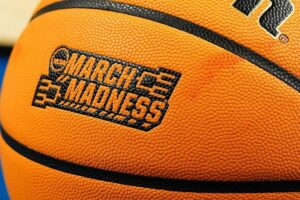
After a great week of conference tournament action, and a final goodbye to the Pac-12 conference, the Men’s NCAA Tournament field is set. On Tuesday, the first of 67 games […]
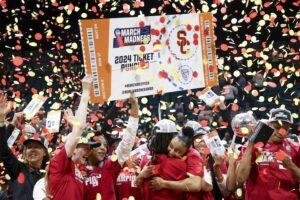
It was a season for record-breaking in women’s college basketball. Multiple scoring records fell, as did records for television viewership. And now we all turn our attention to what is […]
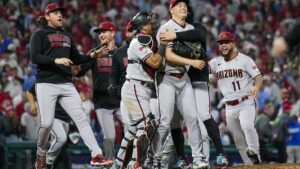
Hard to believe, but this Wednesday, there are baseball games that will count in the standings. The Los Angeles Dodgers and San Diego Padres will play two games in Seoul, […]

The Stadium Course at TPC Sawgrass is one of the most famous places in golf. The Island Green on the 17th is one of the most iconic holes anywhere in […]

In the world of golf, the early season has been dominated by no-names. The PGA Tour needs its stars to step up and start winning. That is definitely the case […]
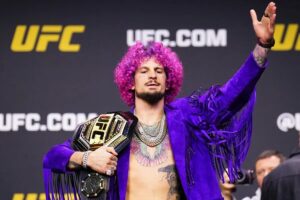
Sean O’Malley leads UFC 299 this Saturday in Miami, as he makes the first defense of his UFC bantamweight belt. He faces Marlon Vera in the main event in what […]
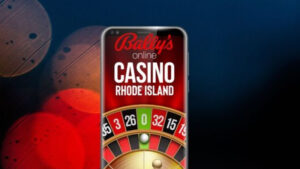
Rhode Island has become the seventh state to launch an online casino market with the opening of Bally’s online casino on Tuesday. The new Rhode Island online casinos market will, […]
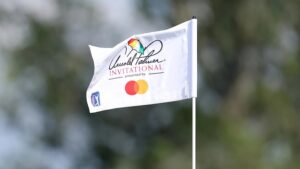
We have reached the 10-tournament pole for the PGA Tour season, and in the first nine tournaments, it has been good to be a longshot. Last week at the Cognizant […]
Are you ready to take your online gambling experience to the next level? Sign up for the LetsGambleUSA newsletter and get the latest news, exclusive offers, and expert tips delivered straight to your inbox.